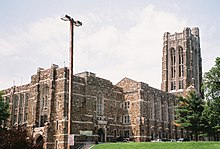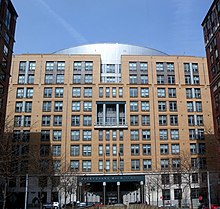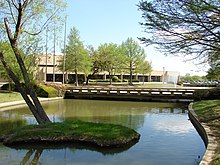Back to school





This week, we're hitting the books with WikiProject Schools. Started in February 2004, WikiProject Schools has built up a collection of 11 Featured Articles, 5 Featured Lists, and 27 Good Articles. School articles are frequent targets for vandals, requiring the watchful eyes and verification resources available at WikiProject Schools. The project maintains lists of articles that need emergency attention, infobox corrections, general cleanup, and merging. We interviewed CT Cooper and Kudpung.
What motivated you to join WikiProject Schools? Do you focus on a type of school, a geographic region, or only schools you have attended?
- CT Cooper: WikiProject Schools was one of the first projects I joined when I became a significant contributor to Wikipedia back in 2007. I have historically focused on schools in Hampshire, England, since that is that is where I am from, and I have made significant to improvements to The Petersfield School, a school I previously attended. However, I have also contributed to school articles for places I have never visited or even previously heard of, often in response to the poor state of some articles I come across, such as Savannah Country Day School.
- Kudpung: I'm a retired teacher, teacher trainer, and lecturer, so 'schools' is naturally a major area of my Wikipedia interest. I started contributing to schools by writing some articles about schools in my home county of Worcestershire, England, in particular Hanley Castle High School which I attended as a boarder when it was still a selective grammar school. I then set out to improve and expand other articles on schools in the county, then the rest of the UK, and finally through participation in WP:WPSCH other school and education related articles, including many in the USA and other countries.
Nine schools are the subjects of featured articles. Have you contributed to any of these articles? What are some of the challenges of bringing a school-related article to featured status?
- CT Cooper: Most of my direct contributions have involved bringing up poor quality articles to a reasonable standard, rather than to FA. However, I have for years assessed articles as part of the assessment department, and that has frequently involved giving advice on how to improve articles to B-class and beyond. From my experience, probably the biggest challenge with getting a school article to featured status is with referencing, and a lack of it is usually the biggest criticism I make when assessing article quality. Getting a good breadth of sources for the details necessary for an FA, particularly on the history of older schools, needs more than a Google search, and often involves a lot of work offline.
- Kudpung: I'm not aware of having contributed to any school FA. Contrary to what is generally believed, it's very difficult to expand many school articles to a reasonable size beyond 'start' or 'C' class; the requirement for independent published reliable sources is generally only met by the most ancient and/or prestigious of all schools. American schools appear to base much of their notability on reports of their sport and athletic results. This is not the case of the UK where school reputations are made mainly on academic achievements that don't necessarily receive heavy press coverage.
How does the project handle the notability of schools? Are there any clear cut-off points for primary and secondary schools?
- CT Cooper: By far the most controversial topic of school articles is the application of notability, with schools being a key battleground in the war over deletionism and inclusionism. The issue has literally been discussed endlessly for years, with much bitterness on both sides.
- Kudpung : The answer is: It doesn't handle the notability of schools. It's interesting to note however that schools are exempted from Speedy deletion section A7 - An article about a real person, individual animal(s), organization (e.g. band, club, company, etc., except educational institutions), or web content that does not indicate why its subject is important or significant. The topic is the source of much invective and bad faith between inclusionists and exclusionists who do not necessarily address pragmatic solutions for school notability. Comparative school performance tables, good school guides, and government inspection grades are not awards and are therefore probably not sources of notability, although they are often cited at AfD. Guidelines for notability are based on an interpretation of a statement made by Jimbo Wales in 2003, and which has become an unofficial precedent for tens of thousands of school articles. In 2011 Jimbo made it clear that the interpretation of his earlier comment is no longer applicable. The quandary is now greater than ever, with decisions on notability being based more on emotion than on common sense and policy. It's very difficult to help the creators of school pages understand that their article is not notable. As an admin, I now largely avoid school AfD because it is absolutely unclear on what basis I should vote and/or close them.
Is neutral point of view an issue when writing school-related articles? In what ways does the project keep POV edits in check?
- CT Cooper: Yes definitely. School pupils often like to write negative, even libellous, remarks about their school on Wikipedia, but this is often simply dealt with as vandalism. More problematic cases include the schools themselves, or even the local authorities in some cases, taking it upon themselves to re-write their school articles.
- Kudpung: It's as important for school related articles as it is for all Wikipedia articles. Most school pages are written and edited by single purpose accounts and often contain a lot of puffery, promotion, and rivalry. The creators of these pages are mainly teachers, school administrators, and local authority personnel who are unlikely to read up on guidelines and policies just for creating one article; they are even less likely to return to the article later, or their own talk page, to see if it has been tagged. They need to be encouraged to revisit Wikipedia to follow up on their articles. Repair and improvement of these articles is carried out by a tiny number of WP:WPSCH gnomes who patiently slog through the lists of school articles requiring attention.
Does the project collaborate with any other projects? Is there any overlap between WikiProject Schools and WikiProject Universities?
- CT Cooper: There is no formal collaboration between WikiProject Schools and any other project, though school articles inevitably overlap with many different WikiProjects. Our main parent project is WikiProject Education, though this is not very active at this time. WikiProject Schools avoids overlap with WikiProject Universities by only covering institutions that do not award degrees in their own right – regardless of if "college" or "school" is in the name, which means that WikiProject Schools does cover further education colleges and sixth form colleges. However, the issues faced by both projects do still overlap, with essays such as Wikipedia:Avoid academic boosterism, which was originally written for universities, being cited for school articles as well. Content about schools also extends to sections in locality articles, which inevitably means working with local, regional, and national WikiProjects for many different countries, including country by country education WikiProjects such as WikiProject Education in Australia.
What are the project's most pressing needs? How can a new contributor help today?
- CT Cooper: WikiProject Schools is always looking for new contributors, and there are plenty of things that can be done to help. Articles in need of emergency, short term attention is used to identify threatened articles, and users are welcome to help keep on top of this list. The article request department lists missing articles, alongside Wikipedia:WikiProject Missing encyclopedic articles/High schools, since there are probably thousands of notable schools still to be written about on Wikipedia. There is also the assessment department which deals with the momentous task of assessing the quality and importance of thousands of school articles. The number of articles in both Category:Unassessed school articles and Category:Unknown-importance school articles is dropping, but both are still backlogged.
- Kudpung: The most pressing needs are attention to the backlogs of school articles for improvement. The project has over 300 participants, but in reality, fewer than ten are truly active and most of those are the project coordinators. Most editors added their names to the project because they believe it is a requirement for creating or editing school articles. A special welcome message has been added to the repertoire of welcoming committee templates, and a dedicated help desk for school articles has been created in the hope of encouraging new editors to seek assistance with school articles. New solutions need to be found to channel new school article editors and creators to the schools project pages before they start work. Urgently needed improvements to the New Article Wizard could be brought into play.
Next week, we'll poke around the showroom before taking a test drive. Until then, polish your hubcaps and visit the archive.



Discuss this story